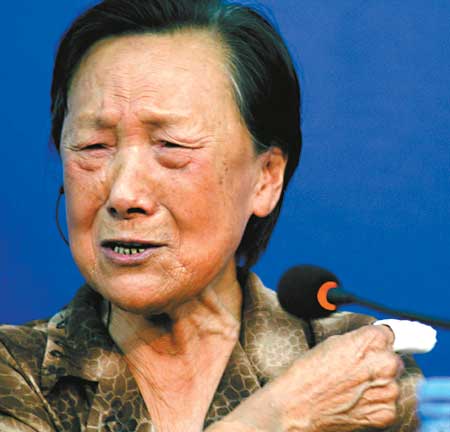NANJING: A Nanjing Massacre survivor has won a defamation suit against two
Japanese right-wing historians who accused her of "faking" her account of the
atrocity.
|

Xia Shuqin, a Nanjing Massacre
survivor, recounts her ordeal at a news conference in Nanjing, East
China's Jiangsu Province, yesterday.
[REUTERS]
|
A local court in the first case of
its kind in China yesterday ruled in favour of Xia Shuqin and ordered the two
Japanese to pay 1.6 million yuan (US$200,000) in compensation and tender a
public apology to her in major media in both China and Japan.
Japan's Teiunsya Corporation Limited was also ordered to stop publishing the
historians' defamatory books and destroy all those already printed.
The three defendants the historians and the publisher didn't appear in court.
Xia said she had waited a long time for the verdict.
"How could the Japanese make such irresponsible remarks against an innocent
civilian like me?" Xia asked after the ruling.
At the age of eight, Xia witnessed several Japanese soldiers kill seven
family members on December 13, 1937, the day which marked the beginning of
Nanjing Massacre.
The invading Japanese troops slaughtered at least 300,000 Chinese, most of
them civilians, in six weeks of burning, looting, raping and killing after
occupying Nanjing, then the national capital.
A Japanese soldier also stabbed Xia three times with a bayonet. But the
terrified youngster managed to hide in a room full of bodies for 14 days with
her four-year-old sister before they were taken to an international safety zone
by an elderly couple.
Their experiences were recorded in John Magee's 105-minute documentary film
and the wartime diaries of John Rabe.
Magee, an Episcopal pastor, and Rabe, a Hamburg businessman, were among the
22 westerners in charge of the Nanjing International Safety Zone created after
the Japanese army captured Nanjing. They recorded the horrible scenes of the
Nanjing Massacre using camera and pen.
But Japanese historians Toshio Matsumura and Shudo Higashinakano cast doubt
about Xia being a massacre survivor.
Matsumura, in his book "Big Doubts about the Nanjing Massacre," and
Higashinakano, in "Thorough Verification of the Nanjing Massacre," questioned
Xia's account. Both books were published by Teiunsya Corporation in 1998.
Xia felt deeply hurt by the books and sued the three in the Nanjing
Intermediate People's Court in November 2000.
Though the verdict took almost six years, Xia said that it was a victory not
just for herself, but also for all massacre victims and their relatives.
Another massacre survivor, 82-year-old Yang Xiulan, who also attended the
hearings, said: "Four of my relatives were also killed in the massacre. I fully
understand Xia's feelings about the defamation made by the two Japanese."
But Xia said it is a pity that none of the defendants showed up at the court.
"I am already 77 years old. I am almost blind and half-deaf. How long do I have
to live? I wish I could see the public apology made by the defendants before I
die."
Xia's lawyer Tan Zhen said that legal experts from China and Japan would try
and work out a feasible way of enforcing the verdict.
Two Japanese lawyers also attended yesterday's ruling in Nanjing on behalf of
Xia's Japanese legal aid group led by 11 voluntary Japanese lawyers.
"This verdict is very encouraging. It is a victory for historic truth. We'll
present the verdict to the Tokyo District Court as proof to back up Xia in a
lawsuit against Higashinakano," said Akira Ibori, with Tokyo Taiju Law Office.
Higashinakano sued Xia in a Tokyo district court in April 2005, demanding she
acknowledge that her suit filed in Nanjing had no basis. But Higashinakano's
lawyer dropped the case the day it was to be heard when Xia went to Tokyo in
June to defend herself.
(China Daily 08/24/2006 page1)